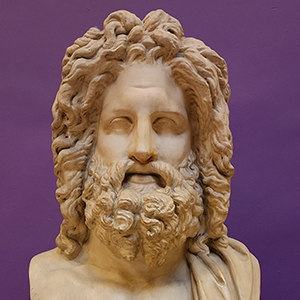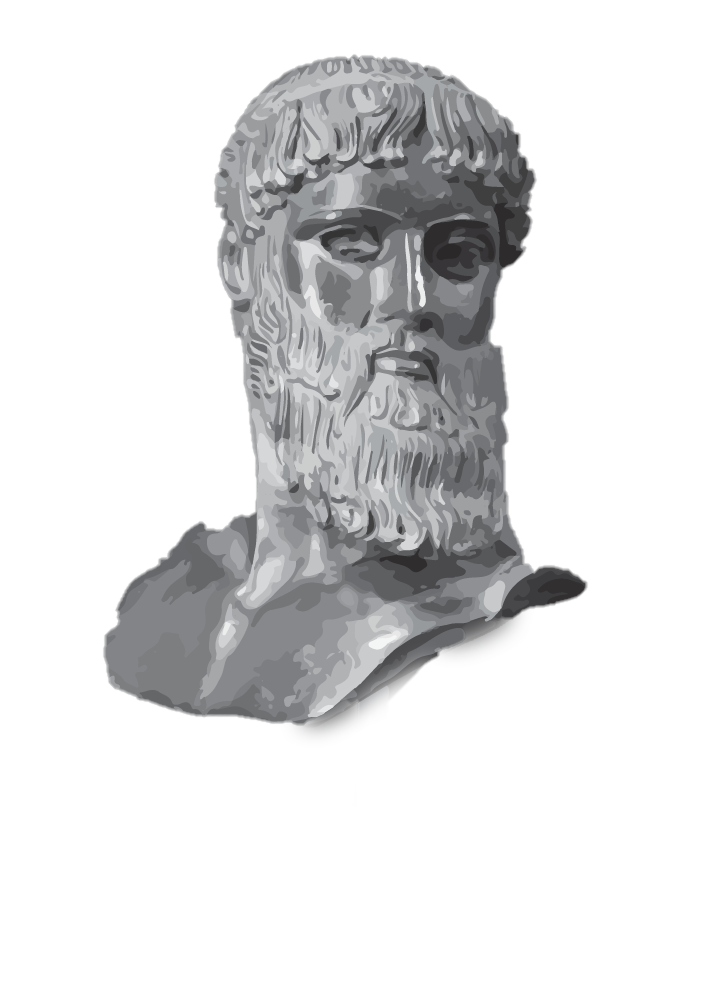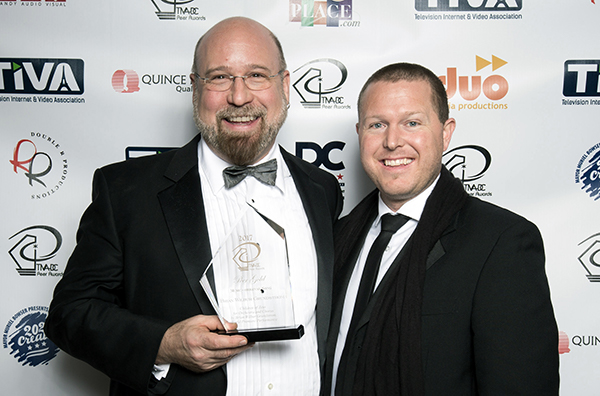Children of Zeus is an incredibly exciting new commission by American Composer Brian Wilbur Grundstrom. It is comprised of 5 movements, each one focusing on one of Zeus's children. Grundstrom has masterfully set to music text about these Greek Gods and Goddesses, capturing their spirits and personalities in this epic new work for orchestra and choir. From the lush, mysterious harmonies of Dionysus to the loud and militaristic Ares. From the beautiful melody of Aphrodite and the cynicism of Hercules, to the almost hypnotic refrain of Apollo. Children of Zeus is a magnificent new work that will keep you engaged, entertained, and educated from first note to last. ~ Maestro Jeffrey Sean Dokken |
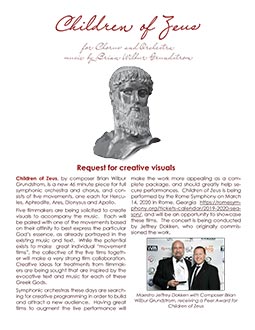 |
|
|
||
Children of Zeus receives Bronze and Gold at the 2017 TIVA Peer Awards. Brian Wilbur Grundstrom with Maestro Jeffrey Dokken, who commissioned and conducted Children of Zeus. |
||
  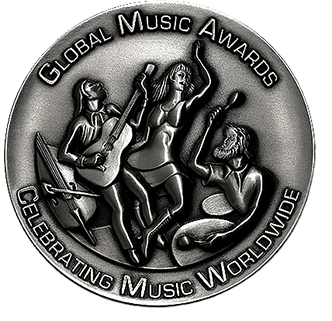 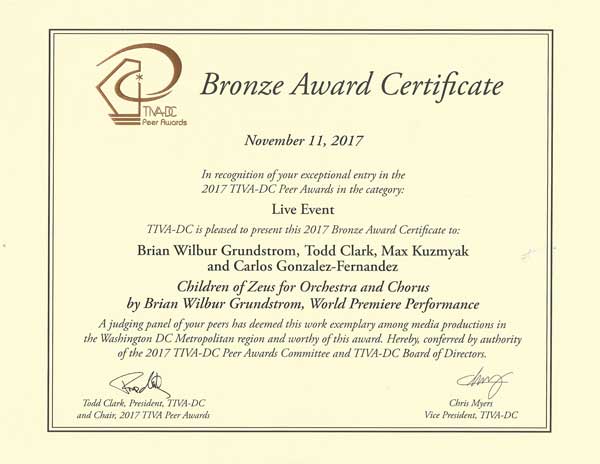 |
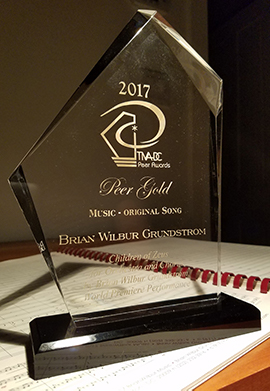 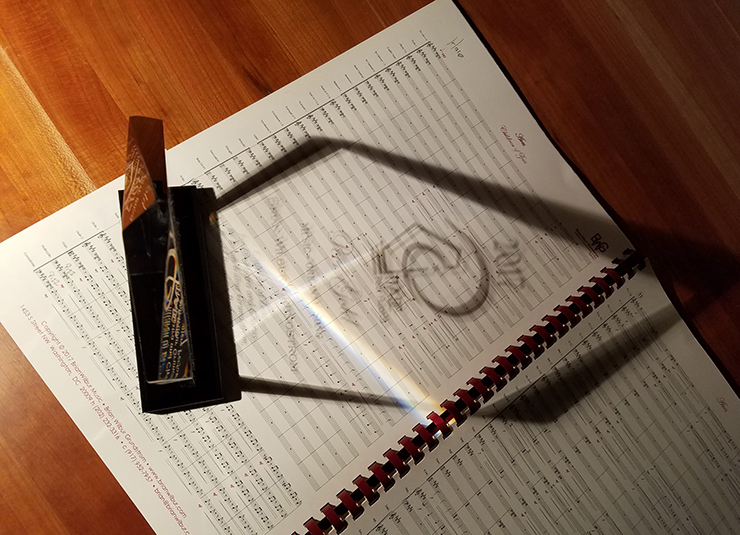 |
Commissioned by |
Hercules - Half man half God, the strongest of all men
Hercules & Co. by Arthur Guieterman
When Hercules, beside the Lake
Of Lerna, cut to pieces
The many-headed water snake--
(That venom-breathing species),
The Mog, rejoicing, danced around,
Of Dignity divested;
But Persons of Discernment frowned
And solemnly protested,
"That Hercules, in having wrought
The Hydra's dissolution
Without a Warrant, set at naught
The Grecian Constitution!"
When Hercules prepared to cleanse
The rank Augean stables,
A thousand scribes with fountain pens
Were busy at their tables.
They wrote him down "A Theorist"
(He did not think as they did);
They called him "Blatant Egotist”
Because he worked, unaided;
They said, "This 'Cleansing' Fad has grown
A Curse that needs repressing.
Why can't he leave this Thing alone?--
The Smell is so distressing!"
When Hercules ensnared the grim
Wild Boar of Erymanthus,
They did not pin one Rose on him
Nor yet one Polyanthus.
"This 'Feat,'" they said, "is not the least
Amazing or surprising;
Besides, he only caught the beast
To get some Advertising!
"His Methods are Undignified
And Tactless!" (That was stinging!)
"A Cultured Person would have tried
To soothe the Brute by singing!"
But Hercules, with faith sublime,
Pursued his many labors.
He said he had a Corking Time,
And loved the pleasant Neighbors.
For some are born to set things right,
While some are built for sneering,
And he that likes to work and fight
Must never mind the jeering.
So here's a health to Hercules
And all his Working Brothers!
The Lofty Few they fail to please,
Perhaps--but there are Others!
Aphrodite - goddess of love, beauty, pleasure, and procreation
Adapted from the “Homeric Hymns”
Muse, tell me the deeds of golden Aphrodite the Cyprian, who stirs up sweet passion in the gods and subdues the tribes of mortal men and birds that fly in air and all the many creatures that the dry land rears, and all the sea. There is nothing among the blessed gods or among mortal men that has escaped Aphrodite.
Aphrodite, the daughter of Zeus, clad in a robe out-shining the brightness of fire, a splendid robe of gold, enriched with all manner of needlework, which shimmered like the moon over her tender breasts, a marvel to see.
Ares - God of War
“Adapted from assorted writings on Ares”
Son of Zeus and Hera
God of war
Ares, Ares
Gloried in strife for strife alone
Hated by all
Loved only by one
Wreaked tulmult and havoc on the battlefield
Helmut, sword, breastplate, shield
Delighted in alaughter and extermination
No respect nor admiration
The coward warrier insatiable and dangerous
Had an affair with the lovely Aphrodite
Responded to insult with outrage
He suffered many a humiliation
Dionysus - God of the Vine, Grape Harvest, Winemaking, Wine, Ritual Madness, Religious
Ecstasy, and Theatre
“Oedipus at Colonnus”
The nightingale haunts the glades, the wine-dark ivy, dense and dark the untrodden, sacred wood of god rich with laurel and olives never touched by the sun,
untouched by storms that blast from every quarter – where the reveler Dionysos strides the earth forever, where the wild nymphs are dancing round him, nymphs who nursed his life.
Apollo - God of music, poetry, art, oracles, archery, medicine, sun, light and
knowledge
“Hymn to Apollo” by John Keats
God of the golden bow,
And of the golden lyre,
And of the golden hair,
And of the golden fire,
Charioteer
Of the patient year,
Where---where slept thine ire,
When like a blank idiot I put on thy wreath,
Thy laurel, thy glory,
The light of thy story,
Or was I a worm---too low crawling for death?
O Delphic Apollo
The Pleiades were up,
Watching the silent air;
The seeds and roots in Earth
Were swelling for summer fare;
The Ocean, its neighbour,
Was at his old labour,
When, who---who did dare
To tie for a moment, thy plant round his brow,
And grin and look proudly,
And blaspheme so loudly,
And live for that honour, to stoop to thee now?
O Delphic Apollo
In order to create contrast and tension, Children of Zeus employs the various stated spectrums of the composer’s pallet as discussed in my artist statement, with the goal of balancing the familiar with the unexpected. Please refer to this statement, as well as the attached form analysis for this piece. Contrast is created both on the macro and micro level. On the macro level, each of the movements in Children of Zeus has a different mood, texture and tempo. Hercules (fast) is an upbeat funny satire, with a formal chorale opening. Aphrodite (slow) is love and beauty. Ares (fast) is war and chaos. Dionysus (slow) is religion, ritual, wine, ecstasy. Apollo (fast) concludes, being the god all things grand – archery, music, chariot, glory etc. Within the movements, various methods are used to maintain interest: First, orchestration is continually varied, with unusual pairings (i.e. low brass and men at E in Ares) as well as orchestral only sections. Second, when repetition is used to create familiarity, there is either a shortening or variation in the repetition to maintain interest. In B and C in Ares, and B in Dionysus, the repetitions are shortened. A in Dionysus is repeated with a slightly increased orchestration, including a two note piccolo solo. When the B melody in Dionysus is first introduced, it is stated with a substantially paired down orchestration - solo violin, harp and bass pizz, but the orchestration grows with repetition. Third, sections with melody contrast to sections without. In Dionysus, the lush melody of B contrasts to A, with its long held notes, dissonance and lack of harmonic movement. Within A, tension is created through chromatic dissonance that resolve to consonance, rather than the use of traditional harmony. Other memorable melodies include C in Hercules and E in Aphrodite. Fourth, of the spectrums listed in my artistic statement, combinations of low and high tension can be paired together for interesting effect, by not always paring elements of like tension. The B melody in Dionysus displays an interesting combination of slow (low tension) and large intervals (high tension). Fifth is rhythm -- I use compound meters to create forward motion that is just slightly off, such as at in the A and D sections of Ares, which contrasts to the more common 4/4 or ¾ found elsewhere. The A section shows a mix of meters within the same section. |
Hercules |
||||
Section |
A |
B |
C |
|
Theme |
|
a |
b |
b |
Tempo |
Medium |
Medium |
Fast |
|
Orchestration |
orchestra |
chorus only, orchestra joins at rehearsal D |
orchestra and chorus |
|
Rehearsal Letter |
|
C |
G |
|
Measure number |
1 |
48 |
101 |
|
Timing on Video |
0:23 |
1:56 |
5:00 |
|
Beginning lyrics |
|
When Hercules beside the lake of Lerna |
When Hercules ensnared the grim wild board of Erymanthus |
|
Aphrodite
|
||||||
Section
|
A
|
B
|
C
|
D
|
E
|
|
Theme
|
|
|
|
|
a
|
a
|
Tempo
|
Slow |
|||||
Orchestration
|
orchestra
|
orchestra and chorus
|
orchestra
|
orchestra and chorus |
||
Rehearsal
Letter
|
|
B
|
D +4
|
E
|
G
|
|
Measure
number
|
1
|
31
|
68
|
88
|
124
|
|
Timing on
Video
|
7:30
|
9:12
|
11:07
|
12:19
|
14:25
|
|
Beginning
lyrics
|
|
Aphrodite Goddess of love
|
|
There is nothing among
|
Aphrodite the daughter of Zeus
|
|
Section |
A |
B |
C |
D |
A |
B |
C |
D |
Theme |
28+14 |
a b |
c d c e c d c |
16 + 12 |
28+14 |
a |
c d c |
16+12 |
Tempo |
Fast |
Slow |
Med |
Fast |
Fast |
Slow |
Med |
fast |
Orchestration |
Orchestra |
chorus and orchestra |
orchestra |
orchestra and chorus |
||||
Rehearsal Letter |
|
B |
D |
G |
H + 13 |
J |
K |
L |
Measure number |
1 |
43 |
58 |
72 |
139 |
181 |
196 |
212 |
Timing on Video |
17:30 |
18:43 |
20:10 |
21:50 |
23:00 |
24:05 |
24:50 |
25:35 |
Beginning lyrics
|
|
Son of Zeus and Hera |
Wreaked tumult and havoc |
Son of Zeus and Hera |
|
Son of Zeus and Hera |
Wreaked tumult and havoc |
Son of Zeus and Hera |
Dionysus |
|||||||||||
Section
|
A
|
B
|
A
|
B
|
|||||||
Theme
|
a
|
b
|
c
|
c
|
c
|
d
|
d
|
a
|
b
|
c
|
d
|
Tempo
|
slow
|
||||||||||
Orchestration
|
orchestra
|
orchestra and chorus
|
1 violin, harp, bass
|
1 flute, harp,
men, strings
|
3 flutes, harp,
chorus, strings
|
harp, men, strings
|
winds, harp,
men, strings
|
Orchestra
|
orchestra and
chorus
|
||
Rehearsal Letter
|
|
A
|
B
|
C
|
D
|
E
|
F
|
G
|
H
|
I
|
J
|
Measure number
|
1
|
13
|
34
|
53
|
72
|
92
|
107
|
124
|
140
|
161
|
181
|
Timing on Video
|
27:00
|
27:47
|
29:03
|
29:50
|
30:40
|
31:33
|
32:12
|
32:55
|
33:50
|
35:02
|
35:53
|
Beginning lyrics
|
|
Dionysus Dionysus
|
|
The nightingale
haunts the glades
|
The nightingale
haunts the glades
|
And untouched
by storms
|
And untouched
by storms
|
|
Dionysus Dionysus
|
The nightingale
haunts the glades
|
And untouched
by storms
|
Apollo |
||||||||||||||
Section |
A |
B |
C |
D |
A |
E |
B |
A |
B |
E |
||||
Theme |
|
|
|
|
|
|
|
|
|
|
||||
Tempo |
Medium |
Fast |
Medium |
fast |
medium |
Fast |
||||||||
Orchestration |
orches-tra |
chorus |
Orchestra and chorus |
orchestra |
Orchestra and chorus |
orches-tra |
Chorus |
Orchestra and chorus |
orchestra |
orchestra and chorus |
||||
Rehearsal Letter |
|
A |
B |
C |
F |
G |
H |
I |
K |
M + 11 |
N |
O |
Q |
R |
Measure number |
1 |
21 |
26 |
43 |
74 |
101 |
108 |
115 |
131 |
155 |
172 |
177 |
194 |
202 |
Timing on Video |
37:10 |
38:04 |
38:19 |
39:05 |
40:34 |
41:37 |
41:50 |
42:12 |
42:55 |
44:00 |
44:39 |
44:53 |
45:37 |
45:57 |
Begining lyrics |
|
Apollo son of Zeus |
God of the golden bow |
Of the patient year |
The Pleiades were up |
|
Apollo son of Zeus |
God of the golden bow |
|
Apollo son of Zeus |
God of the Golden Bow |
|
Apollo son of Zeus |
|
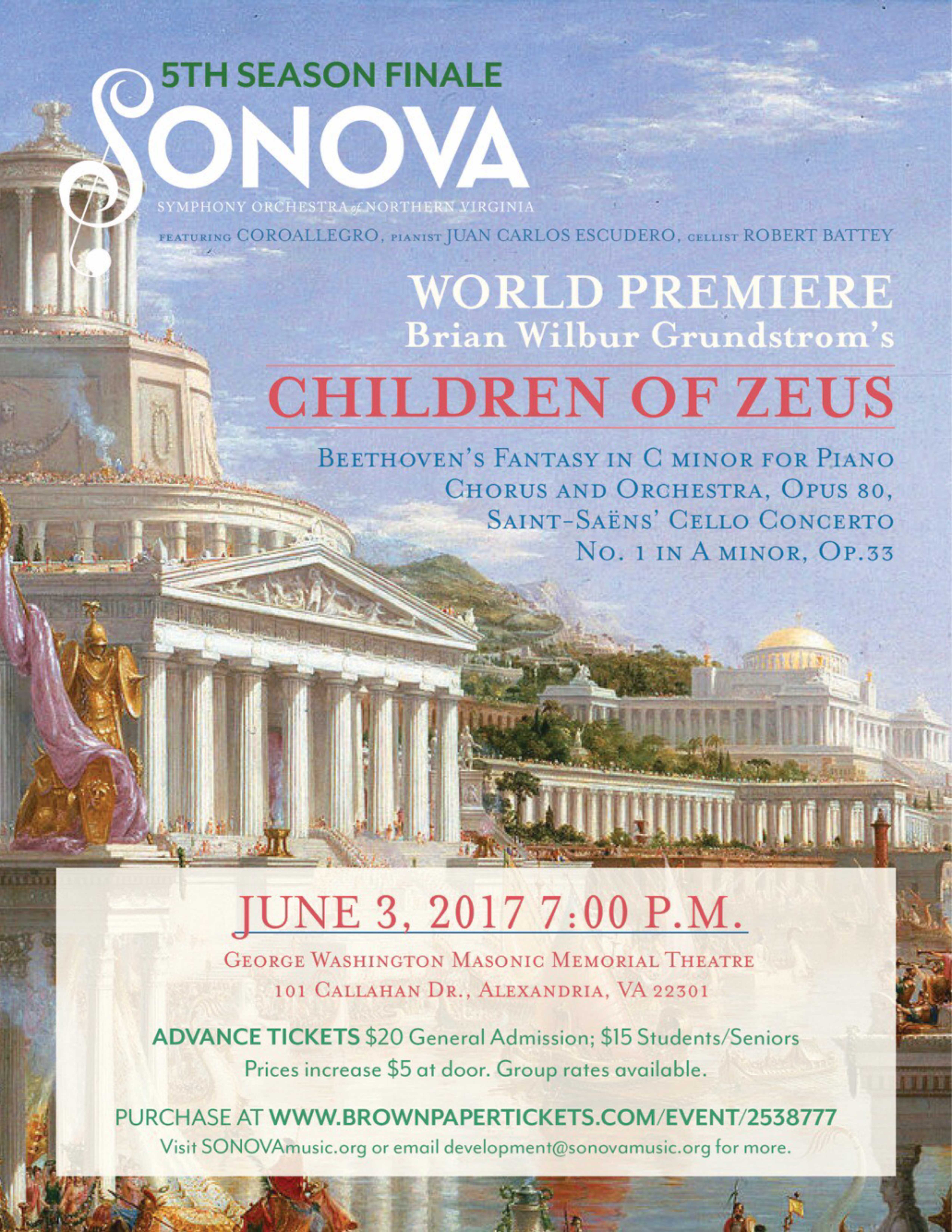 |
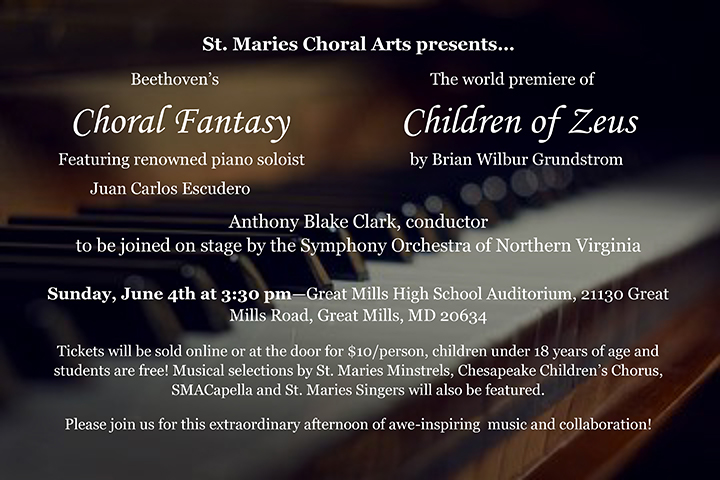 |
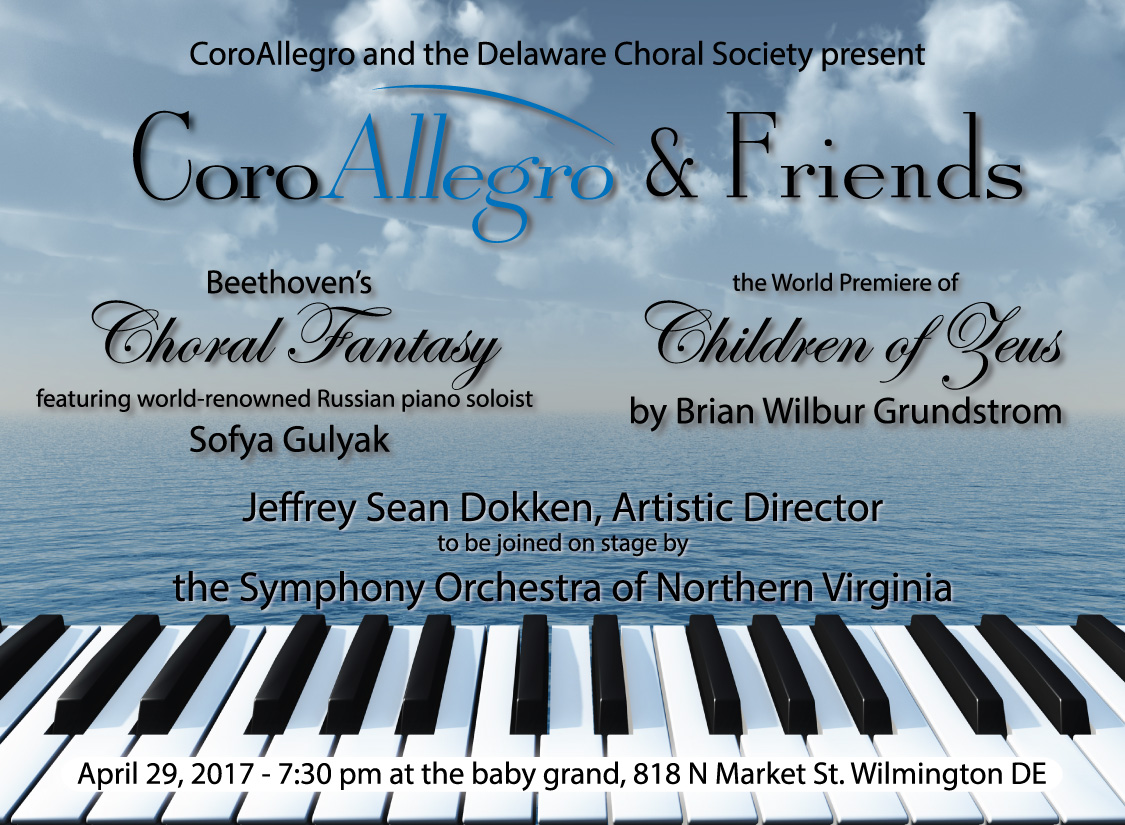 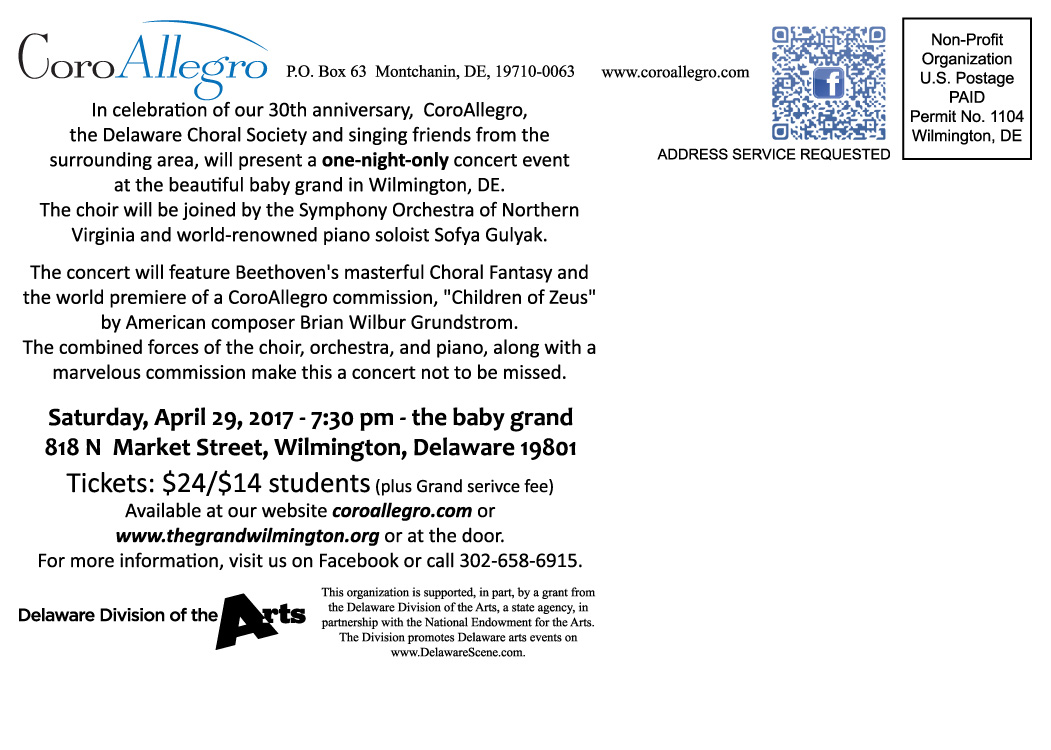 |
The selection of a text to set for a choral piece often presents some interesting challenges. The poetry often gives way to the music. The poetic DNA combines with the music and creates something new. The varied texts for Children of Zeus were selected collaboratively by Brian Grundstrom and Jeff Dokken in order to provide a variety of perspectives on the way we view these Greek gods, and the characteristics that they embody. The Greek myths are derived from an oral tradition which sought to provide an explanation of the world around them. Human characteristics were isolated and objectified with the creation of each god, and as stories, they are an early example of the creative act. Zeus was the great leader of the gods, god of thunder, law and order. He also, according to Edith Hamilton, was famous for his “varied erotic escapades, resulting in many godly and heroic offspring," including the five subjects of our piece: Apollo (god of the sun), Ares(god of war), Hercules (god of strength and a great hero), Aphrodite (goddess of love and beauty), and Dionysius. (God of wine, and by extension, pleasure.) These images are embedded in our culture, and form the basis of imagery in much of western literature, and music, but also psychology (Jung), and even science. In a sense, our own understanding of these myths is being constantly re-created, and as such, the act of recalling and reworking these myths becomes synonymous with the artistic act. The choice of the varied texts in Children of Zeus exemplify this. Two of the texts derive from writings of Ancient Greek poets, Homer and Sophocles: Aphrodite, (Homeric Hymns) and Dionysus, (Sophocles.) Their significance is derived from the thematic material, and less from the words themselves, as they are likely translations from the Greek, to Latin, to other languages. These stories represent the purest form of the myth that we have--and each lauds the particular human characteristic of the god portrayed. Aphrodite is the goddess of beauty and love. Dionysus, the god of wine, and pleasure. The Apollo text, by contrast, is a setting of the Romantic poet Keats, “Hymn to Apollo”, and an example of the reworking of a myth. Written many centuries later, it was composed early in Keats career, and is an offering by a young poet to the god of poetry. In it, he asks for inspiration, and for Apollo to bless his efforts to create poetry. He at first suggests that he is unworthy of the god's attention, " …or was I a worm too crawling for death?" The young poet calls upon the great power of nature (the constellation Pleiades in the sky, the seeds and roots in the earth, the ocean crashing at its labor, and begs Apollo to bless his efforts, and help him "…live for that honor to stoop to thee now." Keats suggests that the act of creating poetry requires the intervention of the gods. By acknowledging the divine nature of the creative act, he has elevated the poet himself to the divine. Arthur Guiterman, in his poems Hercules and Ares, which are the settings for two of the movements, takes a decidedly alternative, and 20th century view of things. Mr. Guiterman, an editor of the Woman's Home Companion and the Literary Digest, and wrote serious and satirical poetry during the early part of the 20th century. Although not well-know today, he was popular during his time, and published several volumes of poetry, and frequently appeared in the New Yorker and other literary magazines. Guiterman’s poems often acerbic observations of twentieth century culture. In his poem Ares, he has reduced the war god archetype to its lowest common denominator---Ares is like the Freudian id, destroying everything in his path, "loved by only one and hated by all." The poem is a comment on the futility of war and upon the base human inclination to dominate and destroy. By contrast, Hercules, the god of strength, and great hero of Homer’s poetry, is viewed differently thought 20th century eyes. Hercules in a modern setting is greeted by skepticism, as his heroic deeds are criticized as violating the law, "…in having wrought the Hydra's dissolution without a warrant, set at naught the Grecian constitution." Because he works (heroically) alone, he is called a “Theorist” and a “Blatant Egoist.” The text raises the question of whether it is possible to have heroes in a world characterized by a culture of criticism. Hercules bravely pushes on, as "he that likes to work and fight must never mind the jeering," despite his failure to please the “Lofty Few.” Children of Zeus presents us with distinct parts of the human experience--from id-like and destructive persona of Ares, to the brave and honorable Hercules, and the beauty, love, poetry and pleasure embodied, in Aphrodite, Apollo and Dionysus. Taken together, the work is a tribute to the art of creation....as the children of Zeus each spring forth from the poets’, and the composer's pen. As singers, and performers of this work, for the first time, we, like Zeus's children, also participate in the creative act. |
full score available upon request 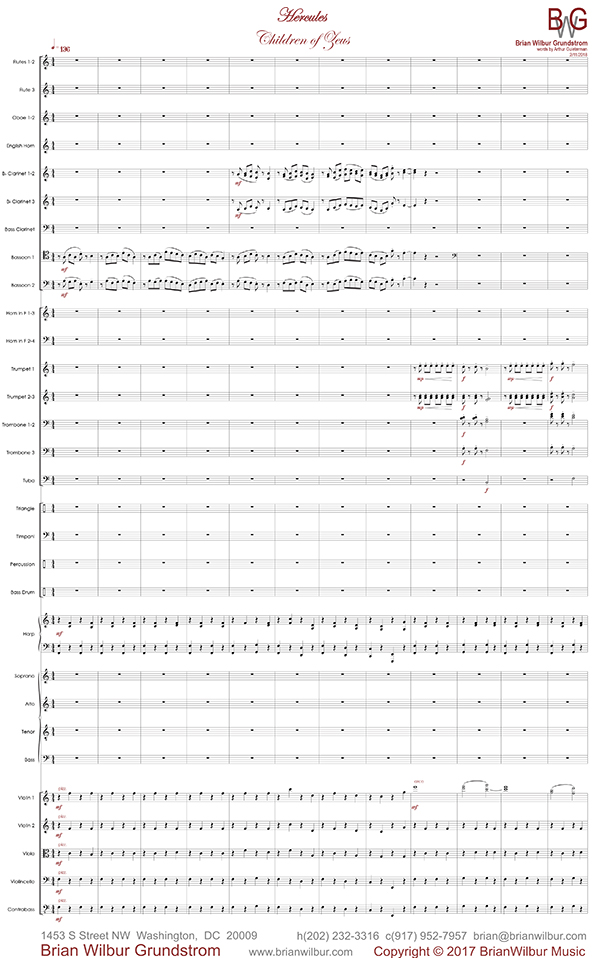 |

